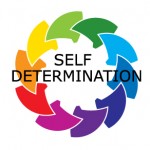Self Determination (Disabilities) « Disabilities – Other Issues
Articles and Publications About
Self Determination for People with Disabilities
"Not only do physically disabled people have experiences which are not available to the able-bodied, they are in a better position to transcend cultural mythologies about the body, because they cannot do things the able-bodied feel they must do in order to be happy, ‘normal,’ and sane….If disabled people were truly heard, an explosion of knowledge of the human body and psyche would take place." ≈ Susan Wendell
- Beyond Guardianship: Toward Alternatives That Promote Greater Self-Determination for People with Disabilities (3/22/18)
NCD undertook this report to foster a greater understanding of guardianship within the context of disability law and policy; to examine the treatment of people with disabilities within the legal system that establishes guardianship; to examine the use of alternatives to guardianship such as supported decision-making; and to make recommendations that will help align the use of guardianship and decision-making alternatives with the Americans with Disabilities Act (ADA) with particular focus on the integration mandate. - Choice Voucher System (Mental Health & Substance Abuse Administration – Michigan Dept. of Community Health)
Self-Determination Technical Advisory. The Choice Voucher System is one option for implementing arrangements that support self-determination. Also see Transmittal Memo for more info. - Making the Move to Managing Your Own Personal Assistance Services (PAS): A Toolkit for Disabilities Transitioning to Adulthood
Another way to think about PAS, especially for Medicaid program eligibility purposes, is as a "range of human assistance provided to persons with disabilities and chronic conditions of all ages, which enables them to accomplish tasks they would normally do for themselves if they did not have a disabilitiy." - Position Statement-Self-Determination (The Arc)
People with intellectual and/or developmental disabilities1 have the same right to self-determination as all people. They must have opportunities and experiences that enable them to exert control in their lives and to advocate on their own behalf. - Self-determination and the Empowerment of People with Disabilities
Leaving aside a discussion as to whether empowerment is merely a buzzword, it is worth noting the meaning shift or drift that has occurred with use of the term since its 17th century origination and the current linkages between empowerment and issues of control over one's life. - Self-determination for People with Psychiatric Disabilities
An annotated bibliography of resources compiled by staff of the University of Illinois of Chicago. - What Is Self-Determination and Why Is It Important?
!e purpose of the Gateway to Self-Determination Project is to “scale-up” efforts to promote the self-determination of people with disabilities. !is publication was developed to help communicate, through the stories of people with disabilities, what is meant by self-determination and why it is important that people with disabilities receive the supports they need to live selfdetermined lives. - Youth in Nursing Homes Seek Alternative Care (NPR)
Picture a nursing home and you think of a place for the elderly. But yearly federal nursing home data shows that there are more than 6,000 young people up to the age of 21 living in American nursing homes. And there are thousands more who are in their early 20s.
Organizations and Services re: Self Determination for People with Disabilities
- Center for Self-Determination
A highly interactive working collaboration of individuals and organizations committed to the principles of self-determination to help all persons create the lives they want, connected to and with their communities and pursuing long term relationships and economic futures. - Independent Living Institute
A policy development center specializing in consumer-driven policies for disabled peoples' self-determination, self-respect and dignity. - Self Advocates Becoming Empowered
Mission is to ensure that people with disabilities are treated as equals and that they are given the same decisions, choices, rights, responsibilities and changes to speak up to empower themselves, opportunities to make new friends, and to learn from their mistakes. - Updated Resource: Person-Centered Practices Self-Assessment 06/21/2022 NCAPPS is pleased to announce that the Person-Centered Practices Self-Assessment has been updated to better assist human services agencies in measuring their progress in developing a more person-centered system. Developed /through NCAPPS technical assistance, the Self-Assessment contains questions about observable practices across eight system domains.

